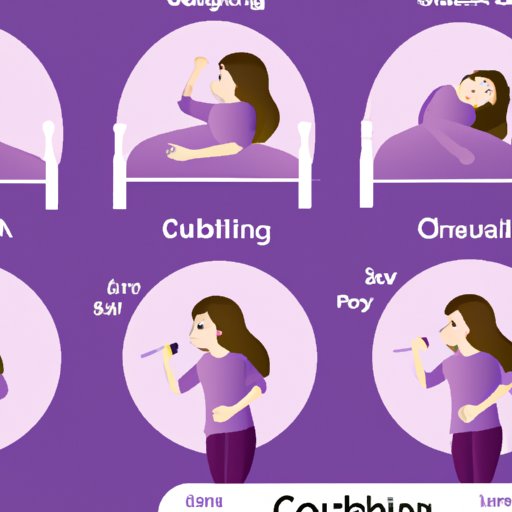Introduction
Do you find yourself coughing uncontrollably at night, disrupting your sleep and leaving you exhausted in the morning? You’re not alone. Nighttime coughing is a common problem that affects millions of people worldwide. It can result from a variety of causes, from allergies to viral infections. Whatever the cause, the result is the same: a poor night’s sleep and a tired body. This article will provide you with tips and remedies for reducing coughing at night so you can enjoy a peaceful sleep.
Remedies to Ease Coughing at Night
One of the simplest and most effective remedies for reducing coughing at night is to drink warm liquids. Warm liquids, such as herbal tea, can soothe your throat and relieve coughing. Additionally, using a humidifier can help to moisten the airways and reduce coughing. Make sure to use distilled water to avoid bacterial growth in the humidifier. Finally, essential oils can be used for cough relief and relaxation. Some popular oils for coughs are eucalyptus, peppermint, and lavender.
Effective Cough Suppressants
There are different types of cough suppressants, including over-the-counter medications and natural remedies. Over-the-counter cough suppressants, such as dextromethorphan and codeine, are readily available at pharmacies. Natural remedies, like honey and lemon syrup, can also be effective in reducing coughing. Regardless of which remedy you choose, make sure to follow the instructions on the label or the advice of a healthcare professional.
Breathing Exercises for Cough Relief
Breathing exercises, like pursed-lips breathing, can help to relax the airways and reduce coughing. To perform pursed-lips breathing, inhale through your nose for two seconds, and then slowly exhale through pursed lips for four seconds. Repeat this exercise for several minutes until you feel more relaxed.
Eliminating Allergens
Common allergens can trigger coughing at night, such as dust mites, pet dander, and pollen. To reduce exposure to allergens, use hypoallergenic bedding and vacuum your bedroom regularly. You can also consider using an air purifier to remove allergens from the air.
Changing Sleeping Position
The position in which you sleep can affect coughing at night. Sleeping on your side can help to prevent acid reflux, which is a common cause of coughing. Alternatively, elevating your head with pillows can also alleviate coughing by keeping mucus from dripping down the back of your throat.
When to See a Doctor
In some cases, coughing at night can be a sign of a more serious condition, such as asthma, chronic bronchitis, or pneumonia. If you experience any of the following symptoms, seek medical attention immediately: shortness of breath, fever, chest pains, difficulty breathing, or coughing up blood. During your doctor’s appointment, your healthcare provider may conduct tests to determine the cause of your cough and prescribe medications or other treatments.
Conclusion
Reducing coughing at night is crucial to achieving a good night’s sleep. There are several remedies and strategies you can try, including drinking warm liquids, using a humidifier, doing breathing exercises, eliminating allergens, and changing your sleeping position. If coughing persists, you should seek medical attention. By incorporating these tips into your routine, you can experience a peaceful, restful sleep every night.
